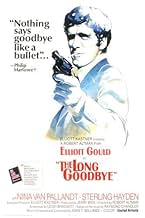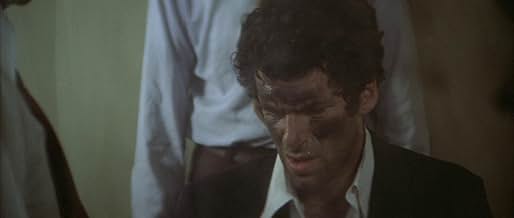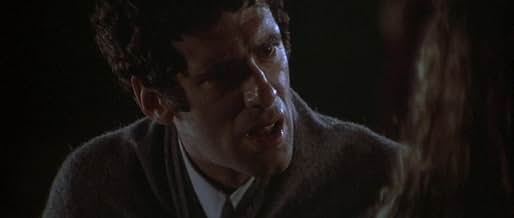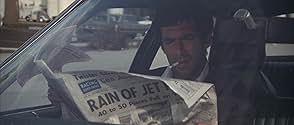निजी जांचकर्ता फिलिप मारलोवे अपने दोस्त को जाम से बाहर निकालने में मदद करता है, लेकिन वहीं पर अपनी पत्नी की हत्या में फंसा दिया जाता है.निजी जांचकर्ता फिलिप मारलोवे अपने दोस्त को जाम से बाहर निकालने में मदद करता है, लेकिन वहीं पर अपनी पत्नी की हत्या में फंसा दिया जाता है.निजी जांचकर्ता फिलिप मारलोवे अपने दोस्त को जाम से बाहर निकालने में मदद करता है, लेकिन वहीं पर अपनी पत्नी की हत्या में फंसा दिया जाता है.
- निर्देशक
- लेखक
- स्टार
- पुरस्कार
- 2 जीत और कुल 1 नामांकन
Stephen Coit
- Detective Farmer
- (as Steve Coit)
Vincent Palmieri
- Vince
- (as Vince Palmieri)
Pancho Córdova
- Doctor
- (as Pancho Cordoba)
फ़ीचर्ड समीक्षाएं
I admit, when I first viewed "The Long Goodbye", in 1973, I didn't like the film; the signature Altman touches (rambling storyline, cartoonish characters, dialog that fades in and out) seemed ill-suited to a hard-boiled detective movie, and Elliott Gould as Philip Marlowe? No WAY! Bogie had been perfect, Dick Powell, nearly as good, but "M.A.S.H.'s" 'Trapper John'? Too ethnic, too 'hip', too 'Altman'! Well, seeing it again, nearly 34 years later, I now realize I was totally wrong! The film is brilliant, a carefully-crafted color Noir, with Gould truly remarkable as a man of morals in a period (the 1970s) lacking morality. Perhaps it isn't Raymond Chandler, but I don't think he'd have minded Altman's 'spin', at all! In the first sequence of the film, Marlowe's cat wakes him to be fed; out of cat food, the detective drives to an all-night grocery, only to discover the cat's favorite brand is out of stock, so he attempts to fool the cat, emptying another brand into an empty can of 'her' food. The cat isn't fooled by the deception, however, and runs away, for good...
A simple scene, one I thought was simply Altman quirkiness, in '73...but, in fact, it neatly foreshadows the major theme of the film: betrayal by a friend, and the price. As events unfold, Marlowe would uncover treachery, a multitude of lies, and self-serving, amoral characters attempting to 'fool' him...with his resolution decisive, abrupt, and totally unexpected! The casting is first-rate. Elliott Gould, Altman's only choice as Marlowe, actually works extremely well, BECAUSE he is against 'type'. Mumbling, bemused, a cigarette eternally between his lips, he gives the detective a blue-collar integrity that plays beautifully off the snobbish Malibu 'suspects'. And what an array of characters they are! From a grandiosely 'over-the-top' alcoholic writer (Sterling Hayden, in a role intended for Dan Blocker, who passed away, before filming began), to his sophisticated, long-suffering wife (Nina Van Pallandt), to a thuggish Jewish gangster attempting to be genteel (Mark Rydell), to a smug health guru (Henry Gibson), to Marlowe's cocky childhood buddy (Jim Bouton)...everyone has an agenda, and the detective must plow through all the deception, to uncover the truth.
There are a couple of notable cameos; Arnold Schwarzenegger, in only his second film, displays his massive physique, as a silent, mustached henchman; and David Carradine plays a philosophical cell mate, after Marlowe 'cracks wise' to the cops.
The film was a failure when released; Altman blamed poor marketing, with the studio promoting it as a 'traditional' detective flick, and audiences (including me) expecting a Bogart-like Marlowe. Time has, however, allowed the movie to succeed on it's own merits, and it is, today, considered a classic.
So please give the film a second look...You may discover a new favorite, in an old film!
A simple scene, one I thought was simply Altman quirkiness, in '73...but, in fact, it neatly foreshadows the major theme of the film: betrayal by a friend, and the price. As events unfold, Marlowe would uncover treachery, a multitude of lies, and self-serving, amoral characters attempting to 'fool' him...with his resolution decisive, abrupt, and totally unexpected! The casting is first-rate. Elliott Gould, Altman's only choice as Marlowe, actually works extremely well, BECAUSE he is against 'type'. Mumbling, bemused, a cigarette eternally between his lips, he gives the detective a blue-collar integrity that plays beautifully off the snobbish Malibu 'suspects'. And what an array of characters they are! From a grandiosely 'over-the-top' alcoholic writer (Sterling Hayden, in a role intended for Dan Blocker, who passed away, before filming began), to his sophisticated, long-suffering wife (Nina Van Pallandt), to a thuggish Jewish gangster attempting to be genteel (Mark Rydell), to a smug health guru (Henry Gibson), to Marlowe's cocky childhood buddy (Jim Bouton)...everyone has an agenda, and the detective must plow through all the deception, to uncover the truth.
There are a couple of notable cameos; Arnold Schwarzenegger, in only his second film, displays his massive physique, as a silent, mustached henchman; and David Carradine plays a philosophical cell mate, after Marlowe 'cracks wise' to the cops.
The film was a failure when released; Altman blamed poor marketing, with the studio promoting it as a 'traditional' detective flick, and audiences (including me) expecting a Bogart-like Marlowe. Time has, however, allowed the movie to succeed on it's own merits, and it is, today, considered a classic.
So please give the film a second look...You may discover a new favorite, in an old film!
The first time I saw this movie was back in the seventies and this was the film that won me over to Robert Altman's great works in the American cinema.
Granted, at the time of the movie's release Raymond Chandler purists naturally didn't appreciate the transformation his knight errant private eye underwent. But nowadays, the viewer must see the film for its great direction, terrific performances, Leigh Brackett's excellent screenplay and the fine cinematography. Not to mention simply the challenge of understanding a truly baffling plot. As in all of Altman's works, this one is peppered with offbeat characters and subtle (and some not-so subtle) situations that positively take you by surprise. As a maverick figure in Hollywood, Altman made sure "iconoclast" was stamped all over this film, it's a true nose-thumbing at every institution that Hollywood reveres; idealistic movie heroes, neat happy-ever-after endings, big budget spectacles, dependable money-making conventions and all around ass-kissing.
But the real treat here is, of course, Elliott Gould, and I don't believe that it's the best thing he's ever done on screen, as many think. He's certainly turned out even better performances than this one throughout the past 3 decades. But yet, in The Long Goodbye, Gould is just so much fun to watch, especially when he's being interrogated by the police or just muttering lines like, "He's got a girl, I got a cat" or "a melon convention" when he gives up trying to get his topless next-door neighbors' attention.
An interesting thing to note at the end of the film - we see the back shot of Marlowe walking away and that to me, was the private eye's closing shot, but then we have a front shot of Elliott Gould who begins playing his harmonica and then continues on up the road doing his little number, dancing a jig, etc. And to me that shows where Marlowe left off and where Gould takes over. So they weren't one and the same after all. Once again, a statement to those who would be too quick to take the Marlowe myth seriously.
The Long Goodbye is vintage Altman, a masterwork to be savoured forever.
Granted, at the time of the movie's release Raymond Chandler purists naturally didn't appreciate the transformation his knight errant private eye underwent. But nowadays, the viewer must see the film for its great direction, terrific performances, Leigh Brackett's excellent screenplay and the fine cinematography. Not to mention simply the challenge of understanding a truly baffling plot. As in all of Altman's works, this one is peppered with offbeat characters and subtle (and some not-so subtle) situations that positively take you by surprise. As a maverick figure in Hollywood, Altman made sure "iconoclast" was stamped all over this film, it's a true nose-thumbing at every institution that Hollywood reveres; idealistic movie heroes, neat happy-ever-after endings, big budget spectacles, dependable money-making conventions and all around ass-kissing.
But the real treat here is, of course, Elliott Gould, and I don't believe that it's the best thing he's ever done on screen, as many think. He's certainly turned out even better performances than this one throughout the past 3 decades. But yet, in The Long Goodbye, Gould is just so much fun to watch, especially when he's being interrogated by the police or just muttering lines like, "He's got a girl, I got a cat" or "a melon convention" when he gives up trying to get his topless next-door neighbors' attention.
An interesting thing to note at the end of the film - we see the back shot of Marlowe walking away and that to me, was the private eye's closing shot, but then we have a front shot of Elliott Gould who begins playing his harmonica and then continues on up the road doing his little number, dancing a jig, etc. And to me that shows where Marlowe left off and where Gould takes over. So they weren't one and the same after all. Once again, a statement to those who would be too quick to take the Marlowe myth seriously.
The Long Goodbye is vintage Altman, a masterwork to be savoured forever.
Usually smoking, and sometimes smirking, Elliott Gould mumbles and stumbles his way through Altman's re-invention of this gumshoe novel by Raymond Chandler. The film's unexpectedly interesting ending suggests a good story, but you'd never know it from the film's plot, which rambles and meanders, seemingly without purpose, a pointless talk-fest wherein Marlowe interacts with the cops, a femme fatale, a buddy who wants to disappear, and assorted hoods and mobsters. It's all rather sordid and seedy as you would expect, except that it's brought up to date, for 1973, and in its "hipness" and sophistication becomes something of a parody of 1940's private-eye flicks. Gould's Marlowe is annoyingly smug, with a too casual manner. And I found none of the other characters to be sympathetic or likable.
The dialogue and the acting are stilted and self-conscious. In one party sequence that takes place on the beach, Dr. Verringer (Henry Gibson) insists that he get his money. The guests stand around, as if they are movie extras brought in for this one day of shooting. The viewer can easily imagine microphones just over the heads of the principal actors, and personnel just off-screen, waiting for Altman to yell: "Cut". Along with other scenes, it looks forced and staged.
The film's best attribute is its cinematography. I especially like the sequence showing human figures retreating into the surf at night. Combined with the sound of ocean waves, it makes for an interesting segment.
Some viewers love this film because of Altman's direction and Gould's performance. Others hate it because it so deviates from Chandler's original story. I personally did not like the film, mostly because of Marlowe, himself, and because of the tangled and convoluted plot, populated by loquacious characters who I found totally not interesting.
The dialogue and the acting are stilted and self-conscious. In one party sequence that takes place on the beach, Dr. Verringer (Henry Gibson) insists that he get his money. The guests stand around, as if they are movie extras brought in for this one day of shooting. The viewer can easily imagine microphones just over the heads of the principal actors, and personnel just off-screen, waiting for Altman to yell: "Cut". Along with other scenes, it looks forced and staged.
The film's best attribute is its cinematography. I especially like the sequence showing human figures retreating into the surf at night. Combined with the sound of ocean waves, it makes for an interesting segment.
Some viewers love this film because of Altman's direction and Gould's performance. Others hate it because it so deviates from Chandler's original story. I personally did not like the film, mostly because of Marlowe, himself, and because of the tangled and convoluted plot, populated by loquacious characters who I found totally not interesting.
Much like the 30's jazz music that opens the movie, The Long Goodbye appears on the surface to take its cue from classic film noir. No surprise here, it is based after all on the Raymond Chandler novel by the same name, Chandler as iconic a figure in the noir realm as you're likely to get and responsible for some of the most distinctly classic moments of the genre (Double Indemnity, The Big Sleep, also Strangers on a Train for Hitchcock). But instead of rehashing styles and themes from a bygone era of film-making, Altman instead takes Chandler's film noir of wandering, and hangs on it his own unique take.
Elliot Gould is Phillip Marlowe. Scruffy, sardonic and alienated private dick with a smart mouth and a cigarette eternally glued to his lips. Altman's twist? He's cool but not the suave kind that would impress dames in the 40's, the Bogart kind. He seems constantly out of place, a bit phased, doomed to observe and comment in his witty repartee on what's going on around him or just let the chips fall where they may. And they do.
Chandler's story is one of his very best. All the staples of noir are present, simultaneously fulfilling the promise of a Phillip Marlowe film and in the same time preparing the ground for Altman's take on it; murder, missing money, unhappy marriages, a private eye hired to investigate. The works. Sprawling and convoluted like the best of noirs usually are. The dialogue crackling with inventiveness, shedding tough guy lingo for a sense of playfulness, rolling in and out of the picture in a stream-of-consciousness way.
Some of the twists and characters seem to carry a sense of seething malice, a fleeting glimpse on the seamy underbelly of the Great American Beast, the scars and ugliness of Hollywood showing behind a faded facade of glamour, an escalating creepiness factor that recalls the later works of David Lynch, predating him by a good number of years as it does. The mousey Dr. Verringe and the whole clinic subplot reminded me of Lost Highway for example.
What really elevates The Long Goodbye in another level is Altman's direction and he has Vilmos Zsigmond with him. This is only my second Altman picture (after McCabe and Mrs. Miller) but 2 hours in his presence were enough to leave an indelible sense that I'm watching the work of a master on top of his craft. Altman's camera is always on the move, slowly panning and floating in and out of the frame, picking up details, guiding the eye but never getting in the middle of the story or screaming for attention. The whole thing has a natural, subdued feel to it, what with the unobtrusive lighting and bleached-out, hazy look; no glitz or glamour here. Only the faded, long-gone impression of it. This is a world we are enmeshed in that surrounds from all sides with hazy reflection.
The Long Goodbye is both a fantastic and somewhat hidden gem of 70's crime cinema and also one of the missing links in the evolution of noir, all the way from Sunset Blvd. to Mullholland Drive. You must visit at some point.
Elliot Gould is Phillip Marlowe. Scruffy, sardonic and alienated private dick with a smart mouth and a cigarette eternally glued to his lips. Altman's twist? He's cool but not the suave kind that would impress dames in the 40's, the Bogart kind. He seems constantly out of place, a bit phased, doomed to observe and comment in his witty repartee on what's going on around him or just let the chips fall where they may. And they do.
Chandler's story is one of his very best. All the staples of noir are present, simultaneously fulfilling the promise of a Phillip Marlowe film and in the same time preparing the ground for Altman's take on it; murder, missing money, unhappy marriages, a private eye hired to investigate. The works. Sprawling and convoluted like the best of noirs usually are. The dialogue crackling with inventiveness, shedding tough guy lingo for a sense of playfulness, rolling in and out of the picture in a stream-of-consciousness way.
Some of the twists and characters seem to carry a sense of seething malice, a fleeting glimpse on the seamy underbelly of the Great American Beast, the scars and ugliness of Hollywood showing behind a faded facade of glamour, an escalating creepiness factor that recalls the later works of David Lynch, predating him by a good number of years as it does. The mousey Dr. Verringe and the whole clinic subplot reminded me of Lost Highway for example.
What really elevates The Long Goodbye in another level is Altman's direction and he has Vilmos Zsigmond with him. This is only my second Altman picture (after McCabe and Mrs. Miller) but 2 hours in his presence were enough to leave an indelible sense that I'm watching the work of a master on top of his craft. Altman's camera is always on the move, slowly panning and floating in and out of the frame, picking up details, guiding the eye but never getting in the middle of the story or screaming for attention. The whole thing has a natural, subdued feel to it, what with the unobtrusive lighting and bleached-out, hazy look; no glitz or glamour here. Only the faded, long-gone impression of it. This is a world we are enmeshed in that surrounds from all sides with hazy reflection.
The Long Goodbye is both a fantastic and somewhat hidden gem of 70's crime cinema and also one of the missing links in the evolution of noir, all the way from Sunset Blvd. to Mullholland Drive. You must visit at some point.
Elliott Gould offers up one of his most amusing performances as Raymond Chandlers' private eye character Philip Marlowe. Marlowe is visited in the wee hours of the morning by his friend Terry Lennox (baseball player Jim Bouton). He does his friend a favour by driving him all the way to Tijuana. Some time after that, he learns that, in fact, Terry's wife Sylvia is dead, presumably killed by Terry, who has also offed himself. Then he is hired for a supposedly simple case: find Roger Wade (Sterling Hayden), a boozy writer, for his wife Eileen (Nina van Pallandt). In the time-honoured tradition of detective fiction, Marlowe will discover that the separate stories turn out to be connected.
Filmmaker Robert Altmans' take on the whole Neo-Noir genre does take some getting used to. It's a lot more irreverent, and goofy, than some people will expect. Devotees of Chandler and classic film noir will likely be dismayed. Scripted by the legendary Leigh Brackett, the dialogue does flow from the mouths of the cast with real ease, and it is reasonably entertaining to watch as this thing develops. After a while, however, even a viewer such as this one can see where the story is headed.
Goulds' version of Marlowe is a real change of pace. He's a quirky, hip, unflappable wise-ass who's willing to head to an all-night supermarket to obtain the only brand of cat food that his pet will eat. And he's just one memorable character in this interesting stew of a film. Hayden plays his washed-up writer for everything that it's worth. Film director Mark Rydell ("The Rose") is clearly relishing his meaty acting role as a brutal Jewish gangster. Henry Gibson ("The Blues Brothers") is an effective weasel as a doctor who expects to be PAID for his services. Danish actress Van Pallandt is alluring as the femme fatale of the piece. And there are a couple of very familiar faces in small roles: Jack Riley ('The Bob Newhart Show'), Rutanya Alda ("Mommie Dearest"), David Carradine as a chatty convict, and even Arnold Schwarzenegger as one of Rydells' goons.
Set in a sunny but rather seedy California of the 70s (complete with spacey hippie neighbours for Marlowe), this is an entertainingly convoluted tale, and a rather slowly paced one, but it always remains...interesting. It's definitely an unusual spin on the typical noir film.
Seven out of 10.
Filmmaker Robert Altmans' take on the whole Neo-Noir genre does take some getting used to. It's a lot more irreverent, and goofy, than some people will expect. Devotees of Chandler and classic film noir will likely be dismayed. Scripted by the legendary Leigh Brackett, the dialogue does flow from the mouths of the cast with real ease, and it is reasonably entertaining to watch as this thing develops. After a while, however, even a viewer such as this one can see where the story is headed.
Goulds' version of Marlowe is a real change of pace. He's a quirky, hip, unflappable wise-ass who's willing to head to an all-night supermarket to obtain the only brand of cat food that his pet will eat. And he's just one memorable character in this interesting stew of a film. Hayden plays his washed-up writer for everything that it's worth. Film director Mark Rydell ("The Rose") is clearly relishing his meaty acting role as a brutal Jewish gangster. Henry Gibson ("The Blues Brothers") is an effective weasel as a doctor who expects to be PAID for his services. Danish actress Van Pallandt is alluring as the femme fatale of the piece. And there are a couple of very familiar faces in small roles: Jack Riley ('The Bob Newhart Show'), Rutanya Alda ("Mommie Dearest"), David Carradine as a chatty convict, and even Arnold Schwarzenegger as one of Rydells' goons.
Set in a sunny but rather seedy California of the 70s (complete with spacey hippie neighbours for Marlowe), this is an entertainingly convoluted tale, and a rather slowly paced one, but it always remains...interesting. It's definitely an unusual spin on the typical noir film.
Seven out of 10.
क्या आपको पता है
- ट्रिवियाThe location for Roger Wade - Sterling Hayden's home was actually Robert Altman's home at the time.
- गूफ़During the scene where Marlowe is chasing Mrs. Wade in her top-down Mercedes 450 SL convertible, the car goes from having head rests to having no head rests in various shots.
- भाव
Philip Marlowe: Nobody cares but me.
Terry Lennox: Well that's you, Marlowe. You'll never learn, you're a born loser.
Philip Marlowe: Yeah, I even lost my cat.
- कनेक्शनEdited into El adios largos (2013)
- साउंडट्रैकThe Long Goodbye
by John Williams and Johnny Mercer
Performed by The Dave Grusin Trio, Jack Sheldon, Clydie King, Jack Riley, Morgan Ames, Aluminum Band, The Tepoztlan Municipal Band
टॉप पसंद
रेटिंग देने के लिए साइन-इन करें और वैयक्तिकृत सुझावों के लिए वॉचलिस्ट करें
विवरण
- रिलीज़ की तारीख़
- कंट्री ऑफ़ ओरिजिन
- भाषाएं
- इस रूप में भी जाना जाता है
- Un largo adiós
- फ़िल्माने की जगहें
- 2178 High Tower Drive, हॉलीवुड, लॉस एंजेल्स, कैलिफोर्निया, संयुक्त राज्य अमेरिका(Marlowe's residence)
- उत्पादन कंपनियां
- IMDbPro पर और कंपनी क्रेडिट देखें
बॉक्स ऑफ़िस
- बजट
- $17,00,000(अनुमानित)
- दुनिया भर में सकल
- $27,504
इस पेज में योगदान दें
किसी बदलाव का सुझाव दें या अनुपलब्ध कॉन्टेंट जोड़ें



































